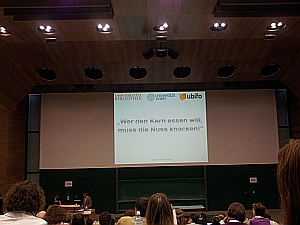Posted: July 9th, 2014 | Author: Sven | Filed under: found on the net, journals | Tags: academic publishing, open access | 3 Comments »
 The two economists Klaus Wohlrabe and Daniel Birkmaier (both from the Ifo Institute for Economic Research in Munich) have published a new working paper in which they analyse the impact of open access publishing in economics on citations.
The two economists Klaus Wohlrabe and Daniel Birkmaier (both from the Ifo Institute for Economic Research in Munich) have published a new working paper in which they analyse the impact of open access publishing in economics on citations.
Their sample consists of articles from 2005 from 13 economic journals (including the top five journals). In addition to standard mean comparisons Wohlrabe and Birkmaier also use a negative-binomial regression model with several covariates to control for potential selection effects and quality bias. For their analysis they used citation data from three different databases, namely the Web of Science, RePEc and Google Scholar.
The results they retrieved are very interisting and might light the debate on open access publishing in academia.
Read the rest of this entry »
Posted: February 5th, 2014 | Author: Sven | Filed under: found on the net, Opinion | Tags: open access, Open Data, open knowledge | Comments Off on Discussion: “It’s the Neoliberalism, Stupid: Why instrumentalist arguments for Open Access, Open Data, and Open Science are not enough.”
 The following blog post is an interesting point of view in the discussion on open science. It originally appeared on Digging Digitally and is reposted under a CC-BY license.
The following blog post is an interesting point of view in the discussion on open science. It originally appeared on Digging Digitally and is reposted under a CC-BY license.
Feel free to comment!
The Open Movement has made impressive strides in the past year, but do these strides stand for reform or are they just symptomatic of the further expansion and entrenchment of neoliberalism? Eric Kansa argues that it is time for the movement to broaden its long-term strategy to tackle the needs for wider reform in the financing and organization of research and education and oppose the all-pervasive trend of universities primarily serving the needs of commerce. Read the rest of this entry »
Posted: December 18th, 2013 | Author: Sven | Filed under: Data Sharing, Projects, Research Data | Tags: European Commission, Horizon2020, open access | 1 Comment »
 Currently, Europe’s eighth Framework Programme takes form: On December 2013 the European Council has adopted Horizon 2020 programme for research and innovation for the years 2014 to 2020.
Currently, Europe’s eighth Framework Programme takes form: On December 2013 the European Council has adopted Horizon 2020 programme for research and innovation for the years 2014 to 2020.
Horizon 2020, which has a budget of around 77 billion euros, will underpin the objectives of the Europe 2020 strategy for growth and jobs, as well as the goal of strengthening the scientific and technological bases by contributing to achieving a European Research Area in which researchers, scientific knowledge and technology circulate freely. Read the rest of this entry »
Posted: August 28th, 2013 | Author: Sven | Filed under: found on the net, Report | Tags: European Commission, open access, Open Data | Comments Off on European Commission: Open access to research publications reaching ‘tipping point’…but what about the data?
 The European Commission (EC) has released a press statement in which the EC claimed that “the global shift towards making research findings available free of charge for readers—so-called ‘open access’ is reaching ‘tipping point’.”
The European Commission (EC) has released a press statement in which the EC claimed that “the global shift towards making research findings available free of charge for readers—so-called ‘open access’ is reaching ‘tipping point’.”
This enthusiastic view of the Commission is based on three studies that that have been funded by the EC:
One study analysed the growth of open access publications, a second evaluated the strategies of funders to enforce open access and the a third addressed open access to scientific data. Read the rest of this entry »
Posted: August 8th, 2013 | Author: Sven | Filed under: found on the net | Tags: economics, open access, Open Data, Research Data | Comments Off on Endorse the Open Economics Principles!
 As I mentioned in one of my previous posts, the Open Economics Working Group has just finalised the Open Economic Principles. Now it is also possible to endorse these principles online. In an e-mail the working group announces:
As I mentioned in one of my previous posts, the Open Economics Working Group has just finalised the Open Economic Principles. Now it is also possible to endorse these principles online. In an e-mail the working group announces:
The Open Economics Working Group would like to introduce the Open Economics Principles, a Statement on Openness of Economic Data and Code. A year and a half ago the Open Economics project began with a mission of becoming central point of reference and support for those interested in open economic data. In the process of identifying examples and ongoing barriers for opening up data and code for the economics profession, we saw the need to present a statement on the guiding principles of transparency and accountability in economics that would enable replication and scholarly debate as well as access to knowledge as a public good. Read the rest of this entry »
Posted: March 28th, 2013 | Author: Sven | Filed under: found on the net | Tags: academic publishing, open access | Comments Off on The darkest site of scholarly publishing
 Today I read an incredible story- published by Declan Butler in the very informative nature special issue on “the future of publishing.”
Today I read an incredible story- published by Declan Butler in the very informative nature special issue on “the future of publishing.”
Most of us know about the massive profit margins scholarly publishers earn every year. According to Björn Brembs the corporate scholarly publishing industry with roughly four billion US$ in profit every year, is a lucrative business. For example Reed Elsevier just published his “Annual Reports and Financial Statements” for 2012 – despite the Elsevier-Boycott in 2012 the company achieved revenues of £ 6.116 billion in 2012.
But as Butler reports in nature (“Sham journals scam authors“) also cybercriminals have understood that they can earn a lot of money with faking existing journals. But what has happened? Read the rest of this entry »
Posted: February 25th, 2013 | Author: Sven | Filed under: Data Sharing, Research Data | Tags: academic publishing, access to data, Guidelines, open access, Open Data | 1 Comment »
 John Paul Holdren, a chief advisor of US-President Obama on science and technology issues, has issued a memorandum that directs those agencies with more than $100 million in research and development expeditures…
John Paul Holdren, a chief advisor of US-President Obama on science and technology issues, has issued a memorandum that directs those agencies with more than $100 million in research and development expeditures…
“…to develop plans to make the results of federally-funded research publically available free of charge within 12 months after original publication.”
According to Holdren the directive is well-balanced:
“We wanted to strike the balance between the extraordinary public benefit of increasing public access to the results of federally-funded scientific research and the need to ensure that the valuable contributions that the scientific publishing industry provides are not lost.”
Read the rest of this entry »
Posted: October 15th, 2012 | Author: Sven | Filed under: Conference, EDaWaX | Tags: Data Policies, Data Sharing, open access | 1 Comment »
 At the end of September, I was in beautifull Vienna for some days and presented a few results of our project at the 6th Open Access Days in a session about “Making Research Data publicly available: opportunities and challenges“.
At the end of September, I was in beautifull Vienna for some days and presented a few results of our project at the 6th Open Access Days in a session about “Making Research Data publicly available: opportunities and challenges“.
It’s been a very nice conference – and some blogposts [Uli Herb -> telepolis (in German) | Astrid Recker -> admtic (in English)] report on the conference and some of the presentations. My colleques Olaf Siegert, Ralf Flohr and I also wrote a summary of the conference for ZfBB (in German) that will be published in the next issue of the journal.
Well, to come back to my talk: In this post I want to point out some single aspects of my presentation: the availability of data policies in economic scholarly journals that are published open access.
Our project compared the number and quality of data policies we found in a sample of 43 open access Journals to a sample of 141 traditional subscription journals in regard to the implementation of data availability policies.
Generally speaking I wondered how open access journals acquit themselves in this context. Prior to starting our analysis I was quite sure that the percentage of journals equipped with a data availability policy would be higher in open access journals than the proportion of subscription journals equipped with such a policy. I even thought that open access journals could have a comparative advantage to traditional subscription journals: Read the rest of this entry »
Posted: February 29th, 2012 | Author: Sven | Filed under: Data Sharing, Opinion | Tags: academic publishing, open access, science | Comments Off on Research Works Act: Partial victory for Open Access
 telepolis yesterday reported that the Research Works Act was pulled back. The bill has caused a lot of trouble within the Open-Access and Open-Data Community: HR 3699 would have prevented agencies of the federal government from requiring public access to federally subsidized research.
telepolis yesterday reported that the Research Works Act was pulled back. The bill has caused a lot of trouble within the Open-Access and Open-Data Community: HR 3699 would have prevented agencies of the federal government from requiring public access to federally subsidized research.
A major supporter of the bill, Elsevier, has withdrawed its support for the Research Works Act – only hours before the the co-sponsors of the bill, Darrell Issa (Republican) and Carolyn Maloney (Democrats) declared the end of the legislation process. It’s interesting (but not surprising) that after Elsevier withdrawed its support, the whole bill was stopped. Someone might think, that this course of action shows the real backers of the bill.
Read the rest of this entry »
Posted: January 11th, 2012 | Author: Sven | Filed under: Opinion | Tags: open access, publishing, science | 7 Comments »
 In the course of my research for data policies of economic scholarly journals for the work package 2 of the EDaWaX-project, I stumbled on the proposal H.R. 3699 of the US House of Representatives with claims “To ensure the continued publication and integrity of peer-reviewed research works by the private sector”
In the course of my research for data policies of economic scholarly journals for the work package 2 of the EDaWaX-project, I stumbled on the proposal H.R. 3699 of the US House of Representatives with claims “To ensure the continued publication and integrity of peer-reviewed research works by the private sector”
First I thought, >okay, just another proposal, nothing to worry about<, but when I read more about it, my opinion changed.
From my personal point of view this proposal would seriously threaten public access to federally funded research in the US, when it becomes law. And the question following is, what will happen in Europe, when the publishers succeed in the US?
And this is not only my own perspective: There are libraries and researchers that got upset, too.
Read the rest of this entry »
 The two economists Klaus Wohlrabe and Daniel Birkmaier (both from the Ifo Institute for Economic Research in Munich) have published a new working paper in which they analyse the impact of open access publishing in economics on citations.
The two economists Klaus Wohlrabe and Daniel Birkmaier (both from the Ifo Institute for Economic Research in Munich) have published a new working paper in which they analyse the impact of open access publishing in economics on citations.
 The following blog post is an interesting point of view in the discussion on open science. It originally appeared on
The following blog post is an interesting point of view in the discussion on open science. It originally appeared on  Currently, Europe’s eighth Framework Programme takes form: On December 2013 the European Council has adopted Horizon 2020 programme for research and innovation for the years 2014 to 2020.
Currently, Europe’s eighth Framework Programme takes form: On December 2013 the European Council has adopted Horizon 2020 programme for research and innovation for the years 2014 to 2020. The European Commission (EC) has released a
The European Commission (EC) has released a  As I mentioned in one of my
As I mentioned in one of my 
 John Paul
John Paul 
 telepolis
telepolis 





